- Author: Deborah Schnur
In my previous blog, I gave an overview of the first two days of COMPOST2023. The event, hosted by the The US Composting Council in January, was an outstanding learning and networking experience. In Part 2, I'm excited to discuss the rest of the event, including the conference sessions at the Ontario Convention Center and Demo Day at One Stop Landscape Supply.
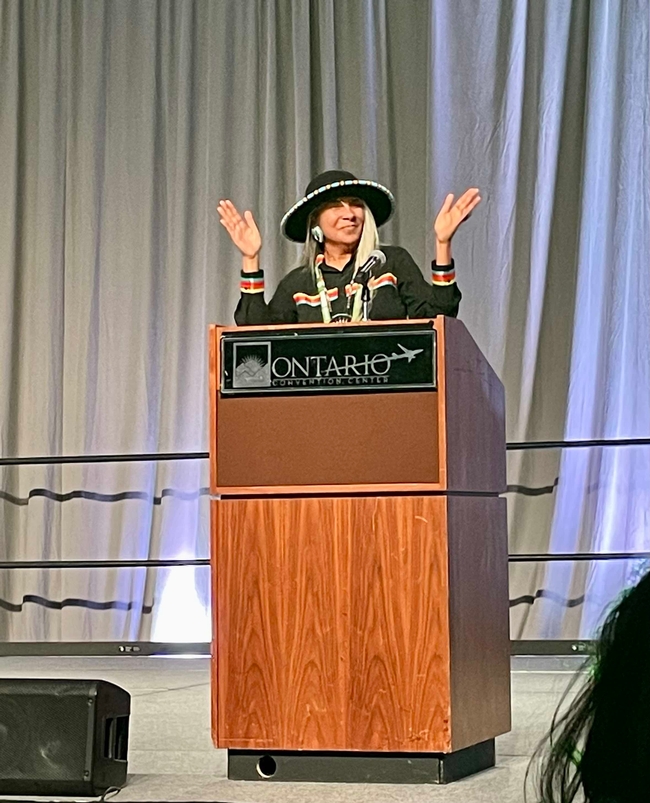
After the keynote, I wandered over to the Exhibit Hall, eager to check out the vendors and information tables. Major equipment vendors such as Komptech and Ecoverse showcased their massive composting machines, while product manufacturers offered samples of compostable bags and utensils. One of the biggest trends was biochar—a carbon-rich, charcoal-like substance created by burning organic material without oxygen. It was interesting to see that even pistachio shells can be used to produce this substance! When blended with compost, biochar enriches the soil by increasing its moisture retention, nutrient content, and microbial activity.
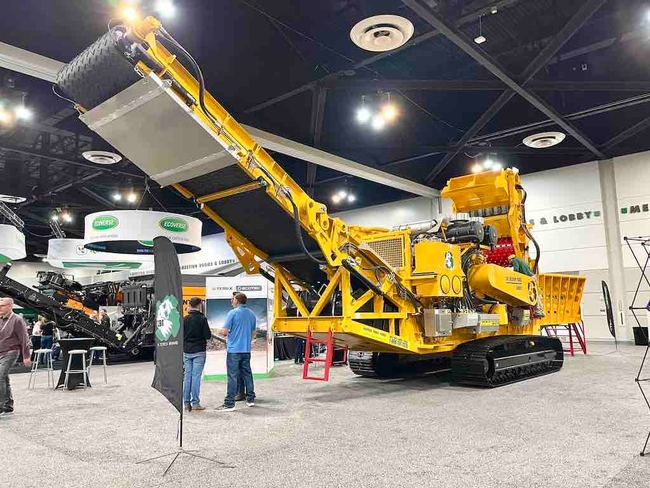
The final presentation I attended on opening day was “Healthy Soils for Healthy Parks: Los Angeles Urban Carbon Farm at Griffith Park” by Lynn Fang, a well-known educator and researcher in composting systems and soil science. LA Compost recently established its first park-based compost site at Griffith Park, using food waste collected from local farmers market drop-offs. Lynn's presentation highlighted a demonstration project of the Healthy Soils for Healthy Communities Initiative, led by TreePeople in partnership with LA Parks and Recreation, Kiss the Ground, and LA Compost, to promote regenerative park management. The study site was a flat, grassy area south of Crystal Springs, where individual plots were treated with mulch from Griffith Park, compost from LA Compost, or no amendment as a control. After 9 months, the researchers found that mulch and compost increased the activity of soil organisms and the percentage of soil organic carbon.
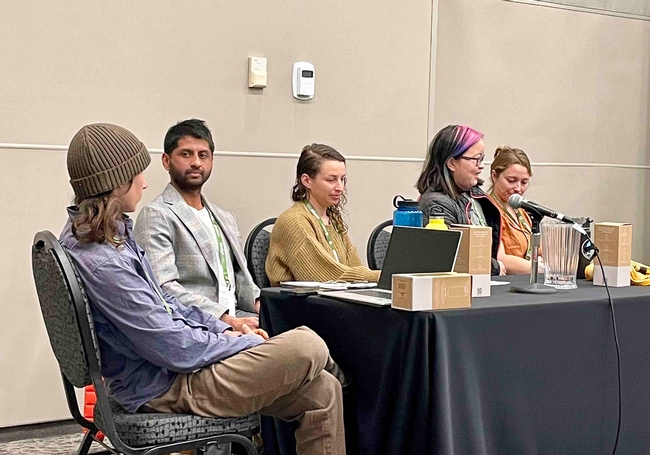
Other panelists showed how technology can facilitate community composting. Tess Feigenbaum, the Cofounder and Operations Director at Epic Renewal in Rhode Island, announced plans to release a mobile application to help with compost site management, process tracking, data collection, and environmental impact reporting. Sashti Balasundaram, the Founder and CEO of WeRadiate, is leading the development of smart sensors for compost piles, which measure temperature and moisture with remote, real-time monitoring.
The final panelist to speak was Elinor Crescenzi, who shared data on the 31 Community Composting for Green Spaces (CCGS) sites in the Inland Empire. Despite a modest $224K budget for labor and infrastructure, these sites managed to divert about 510K lbs of food scraps and 3.7M lbs of organic material from landfills, resulting in emissions reductions equivalent to 908 metric tons of carbon dioxide. That's similar to taking 200 vehicles off the road for one year! In addition to the environmental impacts, the CCGS program also had significant community and social impacts, such as increasing healthy food access, community engagement and education, social support networks, and psychological well-being. Ninety percent of the sites are growing food in addition to making compost.
Another interesting session was “Compost Market Dynamics in California”. One of the speakers was Jeff Ziegenbein, the site manager of the largest indoor compost facility in North America, the Inland Empire Regional Composting Facility (IERCF). Located in Rancho Cucamonga, the facility produces over 200K cubic yards of compost annually from recycled wood and green waste, biosolids, and horse stable bedding using the Aerated Static Pile process. The composting area is completely enclosed to meet air quality regulations. The filtering system does such a good job at odor control I didn't even know this facility is literally in my backyard. The compost, marketed under the SoilPro brand, is used in a variety of applications, including landscaping, horticulture, turf management, agriculture, and roadways.
After attending the morning sessions, I returned to the Exhibit Hall for some Q&A with the finalists of the Emerging Composter Competition. The first place winner was Greg Mankowski of Evolve Pet Composting Services and Consultation in Michigan. His business is very timely, as more and more states, including California, are passing laws to allow human composting. Second place was Justin Brann of Crystal Coast Compost in North Carolina, who composts food waste from many sources, including residences, businesses, farmers markets, and events. Third place was Jameson Meyst of Juicycles, who collects unpicked fruit from San Diego orchards, juices it onsite, and distributes juice and fruit popsicles to the community while composting the remaining waste.
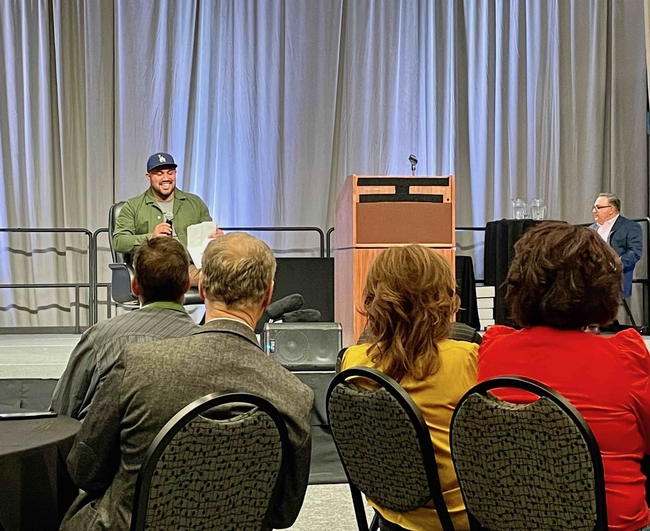
My favorite day of COMPOST2023 was Demo Day, which took place at One Stop Landscaping Supply in Redlands. The place is huge, making it the perfect setting for demonstrations of large-scale composting equipment. As a volunteer, my day started early to direct traffic to the parking area and hand out safety gear to the attendees.
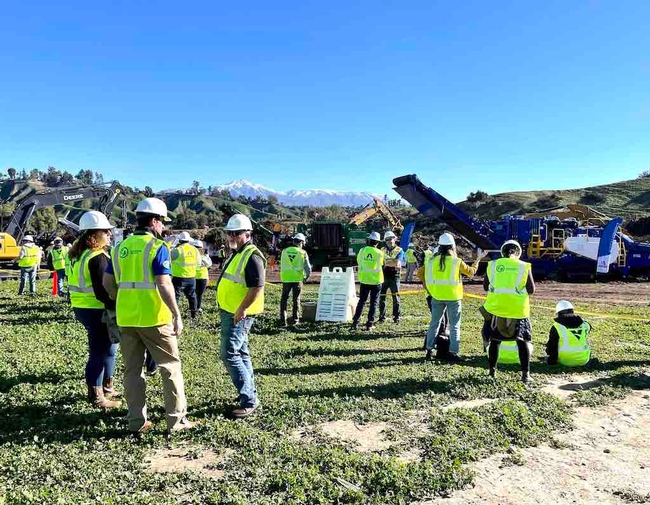
Despite the loud noise of the equipment, the wild burros grazing around the parking lot seemed unfazed. Having only heard about herds of burros roaming San Timoteo Canyon, I was thrilled to see them up close. Although they were quite shy and wandered away when approached, many drivers stopped to snap some photos before heading out.
If this blog has piqued your interest in COMPOST2023, you can find the recordings at Compost University on the US Composting Council website. I'm already looking forward to next year's conference at the Ocean Center Convention Center in Dayton Beach, Florida from February 6th to 9th. The theme of COMPOST2024 is “Making Waves”, which is fitting given the impact composting is sure to have for years to come.
If you want to learn more about composting, check out the videos on our UCCE San Bernardino YouTube channel or contact the Master Gardener Helpline at mgsanbern@ucanr.edu or (909) 387-2182.
Have you enjoyed reading this blog? Do you have questions? Need help with school gardens or environmental education? Feel free to contact me at dschnur@ucanr.edu. I look forward to hearing from you.
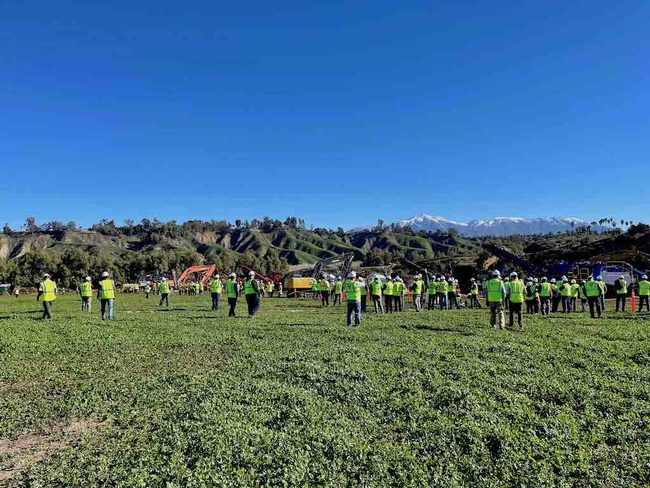
- Author: Deborah Schnur
I couldn't believe it when I heard that COMPOST2023, billed as “the world's largest composting event”, was going to be held in Ontario, California in January. What were the odds that a composting enthusiast such as myself would be so close to the action? I'm so glad I was able to attend as a volunteer! This year's theme was “Capturing Carbon Renewing Soil”, emphasizing the importance of composting in reducing carbon emissions and enhancing soil health.
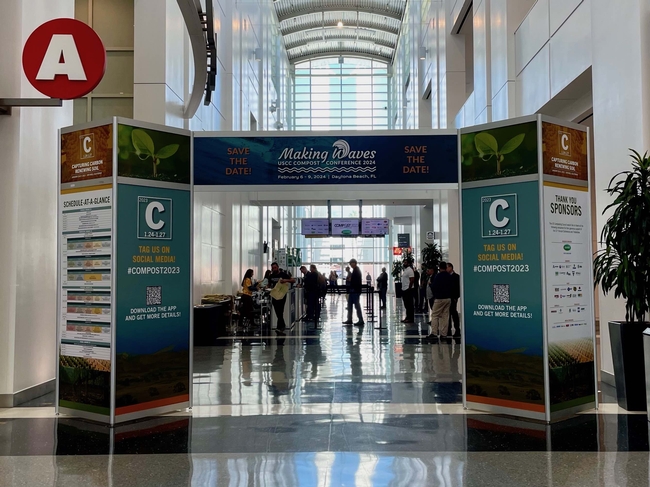
COMPOST2023 ran from Monday, January 23rd to Friday, January 27th, starting with two days of pre-conference activities. On the first day, I attended the Cultivating Community Composting Forum at the Ontario Convention Center. The second day was a Field Day with bus tours of local composting sites. I attended conference sessions at the Convention Center on Wednesday and Thursday and volunteered for Demo Day at One Stop Landscape Supply on Friday. It was a lot to absorb in such a short time.
The Institute for Local Self-Reliance (ILSR) coordinated the Cultivating Community Composting Forum and related Field Day activities. ISLR's Composting for Community Initiative works to advance “local composting to create jobs, enhance soils, protect the climate, and reduce waste through advocacy, training, research, demonstration sites, and coalition building”. The goals of the forum were to share best practices and build support for small-scale, community-based composting.
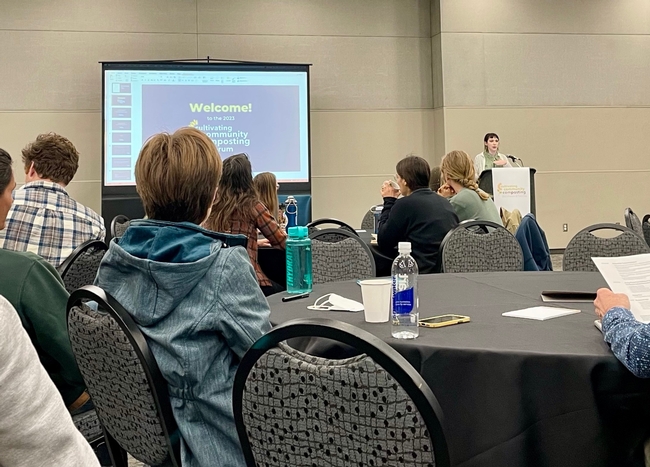
After a short break, the forum attendees reconvened for two peer-to-peer chat sessions on topics including scaling up, business and mission planning, funding and financing, and communications. I attended the sessions on community building and composting methods and best practices. These chats gave me the opportunity to share experiences with composters from across the country–from Peels & Wheels Composting in New Haven, Connecticut to ReMark Composting Solutions in Detroit to Hart's Worm Farm in Irvine.
The afternoon agenda consisted of two concurrent presentation sessions followed by two panels. One of the most memorable presentations was “Generating Excitement About Community Composting in an Urban, Chronically Marginalized Community” by Marvin Hayes and Kenny Moss of the Baltimore Compost Collective. Marvin is the Executive Director of the Collective which collects food scraps from residences and composts them at the Filbert Street Community Garden. Kenny, a student leader in the youth entrepreneurship program, helps manage the composting operations. In a catchy poem, Marvin described the role of composting this way: “Learn so we don't have to burn. Starve the incinerator. Feed the soil. Feed the Community! Clean air for Baltimore.” In 2022, the Baltimore Compost Collective served over 300 customers and increased its waste diversion by 40%.
Kourtnii Brown told the story of how the California Alliance for Community Composting (CACC) launched 120 community composting hubs with a $1.54M Community Composting for Green Spaces grant from CalRecycle. The network of composting sites spanned the state in 6 regions: the Bay Area, Fresno & Central California, the Inland Empire, Greater Los Angeles, Sacramento & Northern California, and Greater San Diego. CACC provided on-site support with skilled staff, infrastructure, community building, and program development. In the summer of 2021, CACC held a Soil Stewardship Training retreat (also called “Soil Summer Camp”) at Amy's Farm to train the trainers at the composting sites. Training recordings are available for public view on YouTube. Since 2020, the sites have diverted millions of organic waste from landfills and produced thousands of cubic yards of compost. The first round of CalRecycle funding just ended in January, and organizations have submitted applications for a second round.
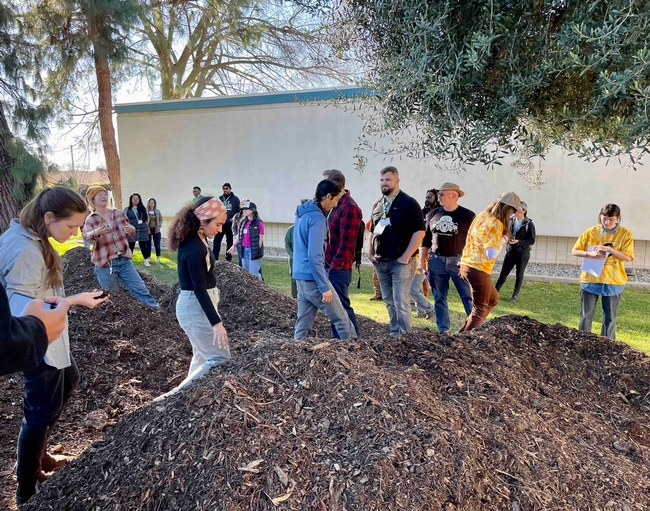
Of the two afternoon composting site tours, I opted for the one that included Temple Beth Israel in Pomona, Claremont Friends Meeting, and the Buddhist Tzu Chi Foundation in San Dimas. Temple Beth Israel was the newest composting site we visited. There are an impressive number of raised beds on the property (around 20 from what I remember), where onions, herbs, greens, and other vegetables are grown in partnership with Uncommon Good. Ten small businesses provide food waste for composting next to the planting beds.
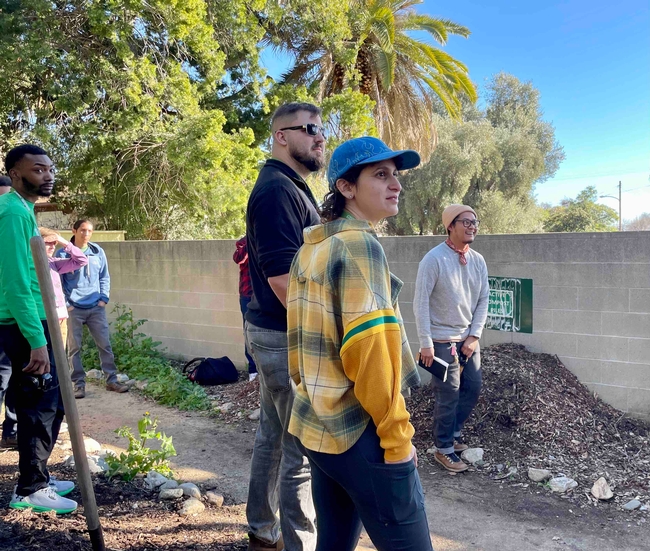
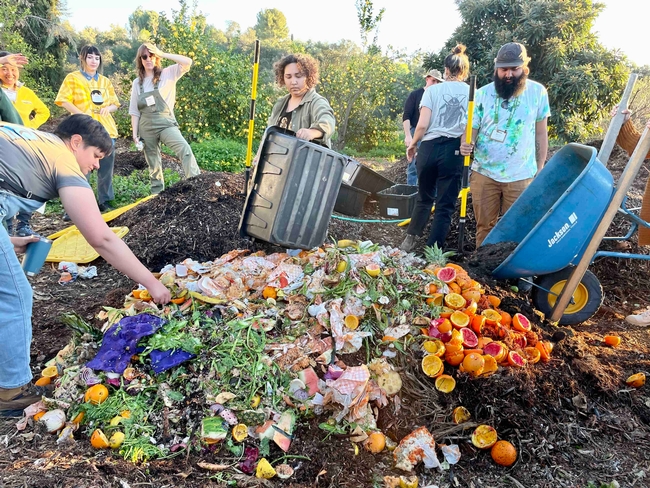
If you want to learn more about composting, check out our UCCE San Bernardino YouTube channel or contact the Master Gardener Helpline at mgsanbern@ucanr.edu or (909) 387-2182.
Have you enjoyed reading this blog? Do you have questions? Need help with school gardens or environmental education? Feel free to contact me at dschnur@ucanr.edu. I look forward to hearing from you.
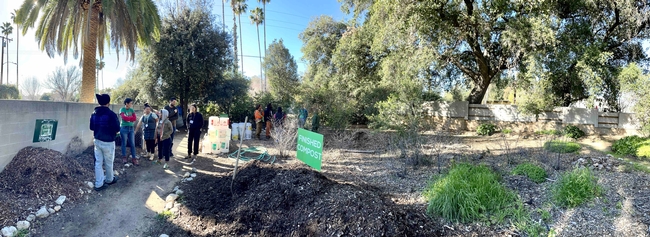
- Author: Deborah Schnur
For the first time in three years, the California Agriculture in the Classroom Conference was held in-person this past September. Ventura County, with its rich agricultural heritage, was the perfect location for the conference to make its comeback. Growing up on the beaches of Long Island, New York, I was excited to attend the conference and spend some time by the shore. The conference agenda was filled with opportunities to learn and network through tours, presentations, exhibits, workshops, and discussions. Best of all, I returned home with three full bags of materials to use for school and environmental education.
Pre-Conference Tour and Reception

My second favorite part of the tour was walking through Air Force One and seeing how it was used during Reagan's time. The plane was retired after Reagan left office and moved to the site of the Library, where the building was constructed around it. The Air Force One Pavilion also houses vehicles from the presidential motorcade.
After the tour, I returned to the hotel for conference registration and a reception with Maureen McGuire,CEO of the Farm Bureau of Ventura County. I also took some time to network with exhibitors including the California Farm Bureau, California Women for Agriculture,Ventura County Farm to School, Students for Eco-Education and Agriculture (SEEAG), and the Ventura County Agricultural Museum.
Opening Session

The last speaker was Christine Birdsong, the Undersecretary of the California Department of Food and Agriculture, who emphasized the importance of agricultural literacy for students and teachers. Because California has about 24 million acres of agricultural land and $20 billion in agricultural exports, the state's economic health is closely tied to agriculture. Agriculture is a growing career field that increasingly relies on technology, and a diverse group of young farmers is needed to replace those who are retiring.
Workshops
The opening session was followed by two workshop sessions. The first workshop I attended was “Youth Can Run a School Garden Program”, presented by Abbi Mars of UC CalFresh Healthy Living and students from Arthur Hapgood Elementary in Lompoc. I was inspired to hear how fifth and sixth grade students run all aspects of the school garden and teach younger students about gardening and nutrition. The student leaders rotate through different teams to learn about composting, fruit tree care, hydroponics, harvesting, and teaching. At the end of the workshop, the students gave a demonstration of the “Pest or Pal?” lesson from the CalFresh TWIGS (Teams with Intergenerational Support) curriculum.
My second workshop was “Bringing Gardening into the Classroom”, led by Veronica VanCleave-Hunt of CalFresh Healthy Living. She and her colleague presented three TWIGS garden lessons that can be taught in the classroom without a garden. The first lesson was “Seed Magic” where students dissect a seed and identify the parts. The workshop attendees received lima bean seeds that had been soaked in water and were instructed to remove the seed coat and identify the leaves, root, and cotyledon (food source). Who knew a simple seed could be so interesting?
The second lesson was “Soil” where we used our senses to observe the soil components of sand, silt, and clay. Then we learned how to conduct a soil test by mixing a soil sample with water in a jar and watching the layers separate. The final lesson was “Eat Your Plants” about how food can come from all plant parts: roots, stems, leaves, flowers, fruits, and seeds. The workshop instructors passed around bags, and the attendees tried to identify the fruit or vegetable inside and the plant part.
After the workshops, we were treated to a hearty lunch and an engaging talk from Coach Kiah Twisselman Burchett, “Grow Through It: Blooming Through Hardship”. Coach Kiah is a cattle rancher turned motivational speaker who shares her triumphs and struggles with body image and weight loss to empower others to find joy in life.
Field Trips and Taste of California Dinner



The day ended with the Taste of California at the Ventura County Agriculture Museum in Santa Paula. Each of the 13 tables was decorated according to a theme by a host organization. Hosts ranged from the Santa Paula High School Ag Department to the California Farmland Trust. I opted for the “CA Central Coast Cornucopia of Freshness” table hosted by the California Women for Agriculture, Ventura County. After a welcome from Shannon Douglass of the California Foundation for Agriculture in the Classroom, Coach Kiah took the reins as the emcee for some table games. At the end of the night, I filled a bag with take-home gifts of seeds, citrus, trail mix, and local Blue Ridge honey from my table host.
Closing Sessions

After the panel were the Make ‘n Takes, 20-minute activities to share with students. During the Beads and Books session, I made a daisy beaded bookmark from natural materials. From the Orange You Glad We Have Farmland? session, I learned the percentage of land available to grow food for the world–only 3 percent! The MyPlate Nutrition activity demonstrated ways to introduce the five food groups to students and help them list foods in each group.
I was sad to see the California Ag in the Classroom Conference come to an end but happy to spend a few hours on the beach before heading home. Next year, I look forward to attending the state conference again and maybe even the national conference in Orlando! If you're involved in agriculture education, I highly recommend checking out the resources that Ag in the Clasroom offers at https://learnaboutag.org and https://agclassroom.org.
Have you enjoyed reading this blog? Do you have questions? Need help with school gardens or environmental education? If so, send an email to dschnur@ucanr.edu. I look forward to hearing from you.
- Author: Deborah Schnur
FoodCorps has held a special place in my heart ever since I served as a FoodCorps service member at Phelan Elementary during the 2019-2020 school year. It was hard work and also immensely rewarding to connect kids with healthy food and share the joy of gardening. I loved seeing the smiles on students' faces when they harvested their first tomato from the school garden and tasted their first “rainbow” smoothie.
FoodCorps' Work
FoodCorps' mission is to “partner with schools and communities to nourish kids' health, education, and sense of belonging.” Their vision is that “every child, in every school, experiences the joy and power of food”. As a member of the AmeriCorps network, FordCorps provides leadership and educational opportunities for service members in limited-resource communities. In addition, FoodCorps advocates for policy change to promote equity and sustainability in the school food environment.
The Service Member's Role
Service members must complete at least 1700 service hours during an 11-month term. They are paid a living stipend and receive a Segal Education Award after successfully completing their term. Those who serve in California also receive a California for All Education Award.
FoodCorps service members focus on three main areas of impact: leading hands-on lessons, influencing nourishing school meals, and building a schoolwide culture of health. In the first area, they teach students to grow, prepare, and taste new foods with interactive lessons linked to academic standards. To influence school meals, service members conduct taste tests, promote healthy food choices in the cafeteria, and work with school district administrators and staff to add local foods to school meals. To build a culture of health, service members collaborate with the entire school community–including teachers, administrators, and families–to plan activities such as family cooking nights and garden work days.
Master Gardeners Help with Garden Training
FoodCorps service members start the school year with a wide range of gardening and farming experience. Some have majored in agriculture, and others have grown only houseplants. Most are expected to start or maintain gardens at the schools where they serve.
To provide their service members with a basic level of gardening know-how, FoodCorps site supervisors in Los Angeles (Rachel Black), Upland (Cassidy Furnari), and San Diego (Janelle Manzano) planned a joint garden training class. Cassidy, the Upland Unified School District (UUSD) Farm to School Manager, asked the San Bernardino County Master Gardeners to help deliver the training at Baldy View Elementary, which has an extensive vegetable garden, native plant garden, and orchard. Maggie O'Neill, the Master Gardener Coordinator, and I were excited to accept the challenge and prepare for the class.

For the next half-hour, I led a hands-on demonstration of how to teach composting to students. I asked the service members to line up and add greens (food waste) to the compost bins followed by browns (mulch). Then everyone took turns watering the compost piles and turning them with shovels. That's all there was to it! To continue the decomposition process, compost needs to be watered and turned on a regular basis. For reference, I gave the service members copies of a composting resource sheet and my favorite compost guide from LA Compost.

After the training, the FoodCorps service members, site supervisors, and Master Gardeners gathered for a healthy lunch including figs, tomatoes, cucumbers, and squash harvested from the Upland school gardens. A fitting end to a productive day! I hope this experience inspires some of the service members to become Master Gardeners in the future.
Meet the Upland USD FoodCorps Service Members

Valerie Tu has returned for a second year with FoodCorps after spending a year as a Fullbright Scholar and English Teaching Assistant in Taiwan. She is teaching at Baldy View Elementary and Citrus Elementary. During her first year at UUSD in 2020-2021, Valerie's interaction with the students was entirely virtual due to the COVID-19 pandemic. Valerie graduated from the New York University Gallitin School of Individualized Study with a Bachelor of Arts, concentrating on the politics of food. While studying at NYU, she also worked as a farm operations intern, a resident assistant, and a culinary intern at the Museum of Food and Drink among other activities.

FoodCorps' Impact
I am so grateful to Valerie, Meagan, and all the FoodCorps service members who devote a year or more to promoting food justice in schools and communities across the county. Last school year, FoodCorps service members taught 15,000 lessons, led 6,000 food tastings, and supported over 350 gardens nationwide. In four Upland schools, approximately 1,400 students received biweekly FoodCorps programming, and nearly 2,000 students participated in lunchtime activities and engagement during the school year. Through these types of hands-on learning activities, service members will help FoodCorps reach its goal for every child to have access to food education and nourishing food in school by 2030.
Have you enjoyed reading this blog? Do you have questions? Need help with school gardens or environmental education? If so, send an email to dschnur@ucanr.edu. I look forward to hearing from you.
- Author: Debbie LeDoux
UCCE San Bernardino County Master Gardener July 2021 Spotlight: Debbie Schnur
This month's UCCE San Bernardino County Master Gardener Debbie Schnur was frustrated by the amount of organic waste she saw being thrown in the trash. She thought, "Rather than add to the landfill, why not turn it into compost for the garden? There's so much food waste being dumped in landfills when it could be used to enrich our soil. By reducing landfill waste, we can also reduce greenhouse gas emissions.” Composting offers a way to promote sustainability in our food system and agriculture.
The Master Gardener Program provided the perfect opportunity for Debbie to turn her frustration into action. Since becoming a Master Gardener in March of last year, her main volunteer activity with the program has been coordinating a composting project for the Root 66 Community Garden in Rancho Cucamonga. She helped form a team that started the project in November, built the system in April, and created the first compost pile at the end of May. Creating a remarkable legacy, the team is now educating garden members about the benefits of composting and how to keep the process going! The Root 66 team is grateful to all the local businesses who donated tools and supplies to this effort.
Over several years Debbie saw Master Gardeners at farmers markets and other community activities. She wondered what the program was all about. She was a little intimidated to ask because she never considered herself an expert, even though she had many years of gardening experience.

She was inspired to finally become a Master Gardener last year after working with FoodCorps, (part of the AmeriCorps Service Network) at Phelan Elementary School. She managed the school garden and greenhouse, taught hands-on gardening and nutrition lessons to over 500 students, and started an after-school gardening club. One of the school staff member volunteers at the garden was a Master Gardener trainee and described the program to her. Debbie also learned another FoodCorps service member in the California cohort completed her Master Gardener training during the school year. Debbie wanted to increase her knowledge of horticulture, serve the community, and thought the Master Gardener program would be an excellent way to accomplish her goals. So, she applied to the UCCE San Bernardino County Master Gardener Program last fall.

She currently has a raised bed garden at the Root 66 Community Garden. She likes trying new recipes and harvesting fresh ingredients from her garden. She also participates in the Root 66 Community Garden FoodShare Project, where members share their produce.
Starting in July, Debbie will be working 8 hours a week as a Community Education Specialist under the supervision of Master Gardener Coordinator Maggie O'Neill. In this position, she will support Master Gardener activities in schools, including school gardens and environmental education.
Debbie is also working with fellow Master Gardener Elizabeth McSwain and the Caramel Connections Foundationto establish the new Seeds of Joy Community Garden in Anthony Munoz Park in Ontario, California. There will be a Little Free Library in the garden, and Debbie is helping to coordinate the Read in Color project with Girl Scout Troop 5574. This is a Cadette Silver Award project for the troop and will bring diverse books to families who utilize the garden.
Debbie volunteered for the San Andreas High School (San Bernardino) Growing Hope Project twice this year, packing lettuce for school lunches and filling planters with soil. San Andreas High School has the most extensive teaching greenhouse on the West Coast!
Debbie was accepted for the New Farmer Training Program (Agricultores del Valle) at the Huerta del Valle Community Garden upon completing her Master Gardener training. Learning about food justice, regenerative agriculture, cooperative business development, and farm management and production help her understand the role of local farms and gardens in creating a healthier and more equitable food system.
Debbie is currently experimenting with growing various uncommon herbs, including fenugreek, borage, and Moldavian dragon head balm. She would like to see what types of culinary and medicinal products she can make from these plants. Her goal is to apply to the Huerta del Valle Incubator Program to access land and assistance to start an herb farm.
Debbie even started a YouTube channel called "Ms. Debbie the Garden Lady” when she was a FoodCorps service member. Be sure to check out her Remote Garden Tour of the Rancho Cucamonga (Root 66) community garden when you get a chance. She would like to find some time to create more YouTube videos or try out TikTok. Debbie is a naturally engaging presenter! In June 2020, she was interviewed on the KVCR NPR radio program “Lifestyles with Lillian Vasquez” about her experience with FoodCorps.

Debbie Schnur passionately believes that food insecurity is one of our biggest global challenges. With a firm belief that “we can improve people's lives and reduce inequities,” she started a second career in Public Health. She wanted to “do something that fed her soul, something that she is passionate about.” UCCE Master Gardeners are thankful that Debbie has become a member of our community. Her drive to improve our world, her intelligence, kindness, and willingness to wholeheartedly embrace other perspectives are an inspiration to us all. Thank you for joining us, Debbie. You remind us of what is truly important!







